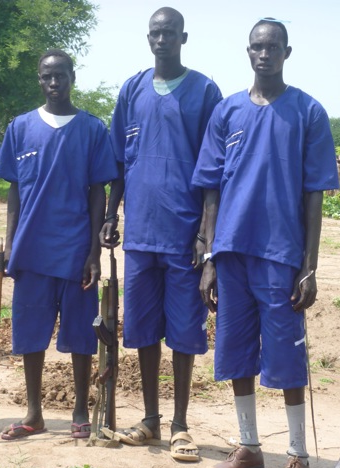A letter from Warrap State: The dangers of disarmament in South Sudan
 On South Sudan’s first day of independence, the dawn chorus was a splattering of gunfire resounding around the villages. The popping AK47s answered the tutterings of the machine guns. The assorted sounds added to the unique harmony of that Saturday morning. But their noise shattered any illusions that it is only AK47s hidden amongst the huts of Warrap State. This was a loud and elaborate assortment of weaponry – anonymously calling their sounds of freedom from these private homes.
On South Sudan’s first day of independence, the dawn chorus was a splattering of gunfire resounding around the villages. The popping AK47s answered the tutterings of the machine guns. The assorted sounds added to the unique harmony of that Saturday morning. But their noise shattered any illusions that it is only AK47s hidden amongst the huts of Warrap State. This was a loud and elaborate assortment of weaponry – anonymously calling their sounds of freedom from these private homes.
By Naomi Pendle
With South Sudan now over one month old, confident, fresh declarations of disarmament have started. Many cities, even before the 9th July, participated in curfews and searches for illicit arms held by civilians. However, now the promise is to extend the disarmament campaign to the majority of the population who are found in the rural areas. This will occur simultaneously with a promised increase of troops deployed into the most insecure states. It has been suggested that a further total of 15,000 troops will be deployed in Lakes State, Warrap State and Unity State and that the disarmament process will start in Lakes State[1].
Currently, in many counties in Warrap State, it is the Titweng (the cattle guard) who offer security for the communities and their property. Consisting of teenage and young adult, civilian males, the Titweng of Warrap State first replaced spears and clubs with guns during the North-South war. The Titweng describe the origin of their weapons as Ethiopia – brought back to Warrap State from the SPLA training grounds in the 1980s[2]. Not only were they the leftover guns of the soldiers, but also the Titweng understand that they were intentionally armed by the SPLA in the1990s. This was to facilitate the Titweng‘s assistance in defense of the SPLA held areas post the division of the SPLA and the conflict from the Nasir-SPLA in Unity State. Since the 1990s, guns have also been acquired by the Titweng through the market and from the booty of battle.
As an armed, experienced and motivated group, the Titweng have acquired a reputation of being the supreme force capable of defending their counties against attacks. They are also capable of carrying out offensives. The government has even informally opted to encourage these groups as a security agent, confident of their SPLA loyalty as well as their strength. For example, a commissioner explicitly stated that troop deployments were not needed certain areas, despite heavy, recent conflict, due to the presence of the Titweng[3].
The current policy of disarmament and increased deployment of troops, if implemented, would effectively replace the Tiweng with the army as the primary means of security in the counties of Warrap State. The Titweng, as civilians, would surrender their arms. Simultaneously, more troops would be placed in Warrap and would be able to offer an alternative source of security.
In a gun-riddled culture, people will not give up their arms with ease. In those cities that have experienced searches by the army, even religious leaders have privately shared that they were able to successfully hide their weapons from these searches[4]. Whatever security the police or army can provide, the public still lacks confidence that these forces can guarantee their safety and the safety of their property, such as the cattle. Therefore, the citizens perceive the need and right to bare arms. Although there is no political space to express this dissent to the government and army in public, they assert their right through this shameless continued possession of their weapons. Maybe there is some sympathy for this public sentiment amongst the politicians, the soldiers and other community leaders.
Yet, despite the difficulties of disarmament, it is assumed that it is desired. The proliferation of small arms in South Sudan is often attributed as a root cause of the seemingly endless inter-community conflicts that are threatening to plague the new state of South Sudan. The majority of these conflicts are fought between civilians using illicitly owned guns. Over 2,500 people died in such violence in 2010 and events suggest that statistics will be just as high for 2011. The gun does not only increase injuries and fatalities, it has also made the violence dependent on the supply of weapons, subjecting it to the control of those with money or other means of supplying guns. It also removes ease of accountability, as it is hard to trace the owner of the gun that caused injury or death. Therefore, if the gun is a cause of deadly conflict, disarmament would seem to bring a solution.
However, there are dangers in the disarmament of civilians, especially if this includes the replacing of the Titweng with troops. While the Titweng are not formally part of any state institution able to regulate their behaviour, in reality they often prove more disciplined than the army. Usually tightly controlled by the cattle-camp leaders and community elders, the Titweng comply with instructions that relate to the use of force and their weapons. This is partly because they have a greater proximity to their leaders than those in the army, often being related and living in the same homes as these elders. The Titweng are also fully reliant on their leaders for access to wealth and marriage, with cattle communally held and controlled by the elders. This means that they are willing to listen to instructions of peace or conflict. Therefore, the violence implemented by the Titweng can both be more limited and, when applied, more focused. For this reason, there is less fear of the unpredictable use of arms.
In contrast, soldiers have gained the reputation for undisciplined behaviour. Accusations against soldiers have included acts such as the violent apprehension of private and NGO cars, and individual soldiers have also been accused of murders. While the army leadership seems far from condoning such action, the distance of these leaders, the lack of financial support for the soldiers and the demands made of them have correlated with this less predictable, violent behaviour.
Furthermore, the motivation of the soldiers may be distinct from those communities they are called to defend. While this may be preferable if the community is accused of causing conflict, this may also result in the soldiers being less willing to enter even defensive combat. Experiences in the grazing lands of Warrap State have seen soldiers flee in the face of attacks on cattle due to the lack of incentive to protect them and the high risk of death. In contrast, the Titweng, guarding their own family’s wealth, are highly motivated and more willing to take exceptional risks. Furthermore, soldiers from other communities can appear confused in their allegiances, being accused of fighting against the host community and adding to the complexities of the conflict.
While independence has bought fresh hope, there is no certainty that it has bought improved security. Although there has been little violence, the increased rainfall at this time of year often suspends conflicts irrespective of intention. The flooded land, rivers and swamps provide a natural, but temporary, barrier against conflict. However, when the waters dry, there is no faith that the improved security will continue. Communities hope that there will be a disciplined, motivated force to guard themselves and their property. The communities of Warrap State would ordinarily assume the Titweng, and not the troops, would take up this role. Disarmament could be dangerous if it replaces this controlled, traditional security mechanism with something altogether less familiar and predictable.
Naomi Pendle teaches at the University of Bahr el-Ghazal (Wau) and Marol Academy (Warrap State). She writes a regular Letter from Warrap State for Making Sense of Sudan.






[…] With South Sudan now over one month old, confident, fresh declarations of disarmament have started. Many cities, even before the 9th July, participated in curfews and searches for illicit arms held by civilians. However, now the promise is to extend the disarmament campaign to the majority of the population who are found in the rural areas. This will occur simultaneously with a promised increase of troops deployed into the most insecure states. It has been suggested that a further total of 15,000 troops will be deployed in Lakes State, Warrap State and Unity State and that the disarmament process will start in Lakes State[1]. […]
Great article! I however have one question. The role the Titweng play as you describe it sounds very similar to me to that of a police force. Just like the Titweng, a local police force usually consists of people from the local community who better understand the needs of the people they are paid to protect. Would it thus not be a good idea to establish a local police force mainly consisting of Titweng? This way government control, improved security and local needs are merged.
Excuse me if this is completely absurd/impossible/… but I have no real knowledge of this topic.
For Weber, statehood lay in the achievement of a monopoly on the legitimate use of force. This is unsurprising. Without the ability to compel compromise, the peaceful provision of goods and services becomes impossible. If, as T. Lindsay Moore contends, popular quiescence in nationhood depends on physical security, productive well being, and cultural continuity, then the ability to wield, and simultaneously to limit violence is clearly a prerequisite. Weak states with a largely institutional identity and a questionable degree of internal control (juridical sovereignty, externally-conferred) can and have appeared throughout history (unified Sudan is one), but their legacy is generally inauspicious. Outcomes range from long war (Lebanon) to state collapse (Liberia) to sustained malfunction (DRC).
I agree with Ms. Pendle that the imperative for South Sudan’s leadership, as for its people, is to find a path that allows for the peaceful negotiation of grievance, and that peace is not necessarily synonymous with disarmament. Complete disarmament is often impractical when war ends. As Joanna Spear points out, weapons may be imbedded in societies emerging from conflict, often for practical reasons (as markers of status, or as means of security and income-generation). Clearly, this same situation today applies in Warrap State, South Sudan.
Outside observers who prescribe disarmament would do well to remember the example of the American colonist at the time of the Revolution: the same muskets used by the militia that defied the British at Concord put food on the table and provided a measure of public safety, and were at various times used to put down foreign incursions, slave revolts, native attacks, and local feuds. A century later, they were still commonplace in the American West for many of the same reasons. While some of these uses are morally defensible, others are not. However, these weapons have become embedded in the community culture. Removing them would have posed a new set of problems.
According to Ms. Pendle, failed disarmament in Warrap State risks popular alienation at best, and a security dilemma at worst, for it raises not only the possibility that some will hide their weapons and thus increase their relative power vis-a-vis neighbors, but also that trusted agents (the Titweng) will be replaced by institutions that are (A) alien, and (B) less reliable, both subjectively and objectively. The existing patronage system also provides a clear lever that the central government can use to influence Titweng behavior. By recognizing cattle-camp leaders and elders as de facto authorities for public safety purposes, the central government can reinforce their status both within and outside the community. In order to receive these unique benefits, however, leaders can be required to hold accountable those fighters under their direct authority.
This is not to say that soldiers and other public security forces do not have any place in Warrap State. In fact, while the wholesale replacement of the Titweng through rapid disarmament is obviously unwise, cementing the Titweng as the sole legitimate source of long-term safety and security would be equally counter-productive. Aarnout’s suggestion — that police be recruited locally — is an excellence example of compromise, recognizing the central government’s need to gradually promote broader identities as well as the increased legitimacy of home-grown solutions. Another possibility might be the commencement of joint patrols in which Titweng serve alongside soldiers from elsewhere in South Sudan.
The titweng are a local militia and living in that part of the world without a stable central government they must be armed for the protection of the people. Dis-arming the citizenry and the local militia is ill-advised and I would resist if I lived in that state.